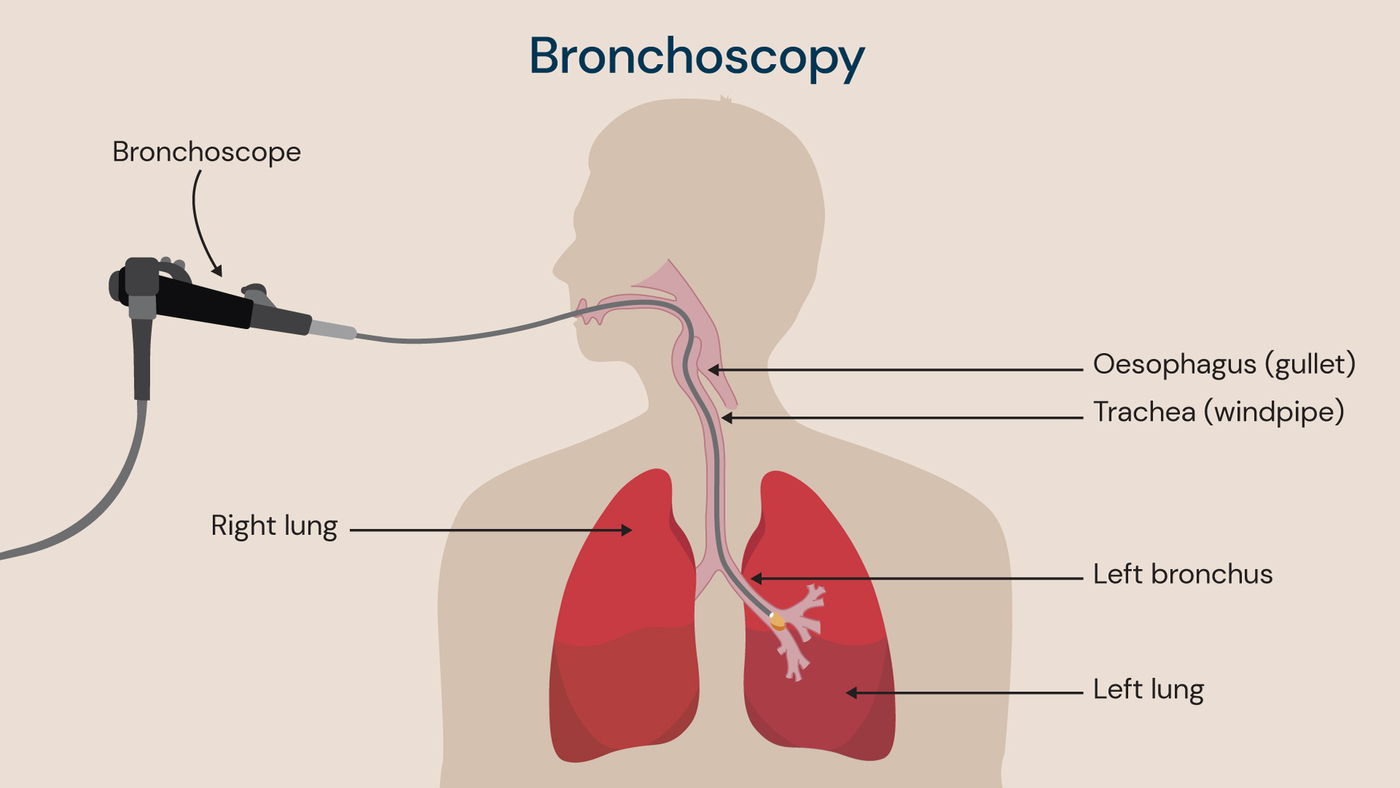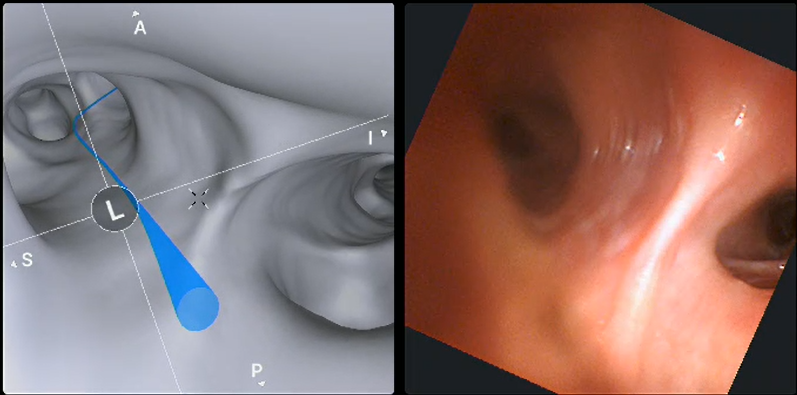What is a bronchoscopy?
A bronchoscopy is an investigation that examines the inside of your airways and your lungs. Our lung specialists insert a very thin flexible tube, called a bronchoscope, into your mouth and guide it down your airways. The tube has a light and camera on the end which enables our team to see your airways in more detail, including any abnormal areas that need to be examined closely.
Inserting the bronchoscope also allows our lung specialists to take samples of cells (called a biopsy) to check if they are cancerous. This is done by passing specialised tools down through the bronchoscope, directly to the abnormal area. Sometimes, the specialist might take samples of fluid from your lungs, instead of cells or nodules (small tumours).
Why is a bronchoscopy performed?
A bronchoscopy may be recommended if your symptoms or previous investigations suggest that you have abnormal cells or growths in your lungs or airways. Lung cancer can be a complex condition to treat as it’s often diagnosed at an advanced stage once the cancer has spread. However, the sooner it’s caught, the better the chance is that it can be successfully treated.
Having a bronchoscopy and biopsy allows our specialists to determine whether your airway and lung abnormalities are cancerous, in turn determining the best treatment path for you.

Aside from being used to biopsy and diagnose lung tumours, bronchoscopies can also be used to diagnose lung infections or to understand other issues with your lungs like structural abnormalities. Specialists at Royal Brompton and Harefield hospitals can diagnose fungal lung infections using a bronchoscopy, sampling fluid from your lungs to confirm that presence of fungal infections.
When should you have a bronchoscopy?
Your consultant will recommend whether a bronchoscopy is necessary for you, based on your symptoms, current condition, and the outcome of any previous scans. You might be recommended to have a bronchoscopy if you have symptoms such as:
- a persistent cough
- coughing up blood
- abnormal results on X-rays or CT scans
- shortness of breath
- wheezing
- recurring pneumonia
What happens in a bronchoscopy procedure?
Bronchoscopy procedures begin with the bronchoscope being inserted through your mouth and passed down to the airways and lungs. You may be given an intravenous medication such as midazolam to relax you for the bronchoscopy procedure. Depending on your reaction to the medication, you may experience drowsiness during the procedure and may have little to no recollection of its details. You will be awake but relaxed and should not feel any pain during the procedure.
The specialist carrying out the procedure can see images produced by the camera, providing a clear, magnified view of the airways and any abnormalities, such as tumours, inflammation, infections or bleeding, that are present.
There are different types of bronchoscopy procedures available with our specialists. Your consultant will recommend which type of bronchoscopy is the best for you, based on your symptoms and medical history.
Transbronchial biopsy (TBB)
In a TBB procedure, small tissue samples are taken from the lungs using a bronchoscope combined with specialised biopsy tools. This procedure allows our specialists to examine your lung tissue for various conditions, such as infections, inflammation, or cancer. TBB is often used when abnormalities are found on imaging scans, like a chest X-ray or CT scan.
TBB is minimally invasive and can help with diagnosing diseases like interstitial lung disease, sarcoidosis, and lung cancer, without the need for open surgery. However, it carries some risks, including bleeding or pneumothorax (a collapsed lung).
Endobronchial ultrasound-guided transbronchial needle aspiration (EBUS-TBNA)
EBUS-TBNA is a minimally invasive procedure that combines ultrasound and bronchoscopy to collect tissue samples from the lymph nodes in the chest or tumours in the lungs. The bronchoscope, equipped with an ultrasound probe, provides real-time imaging of structures in the chest, ensuring precise guidance during needle aspiration of the suspicious areas.
The needle aspiration section of the procedure involves a thin needle being passed through the wall of your airway into the nodule or lymph node that requires examination. The needle at the end of the bronchoscope is used to extract tissue samples for further testing.
EBUS-TBNA is commonly used for diagnosing and staging lung cancer, identifying infections, and assessing conditions like sarcoidosis. Its accuracy and ability to access deeper lymph nodes without surgery makes it a valuable diagnostic tool, with fewer complications compared to more invasive biopsy techniques or open surgery.
Bronchoalveolar lavage (BAL)
BAL is a procedure used to collect a sample of fluid from your lungs for examination. During the BAL procedure, a bronchoscope is inserted through your mouth or nose into your lungs, and a sterile saline solution is inserted into the specific part of your lung that requires examination.
The fluid is then suctioned out and analysed to check for infection, inflammatory conditions, and lung diseases including pneumonia, interstitial lung disease, and cancer. The results of the fluid analysis provide important information about the cellular makeup of your lungs, as well as any immune problems, and this method is less invasive than surgical methods.
Robotic bronchoscopy and biopsy
A new robotic-assisted technology, the Ion endoluminal system (also known as ‘Ion’), allows respiratory specialists to take biopsies of very small lung nodules which would otherwise be difficult to reach.
The procedure is carried out under general anaesthetic, with a very thin and flexible catheter inserted into your airways via your mouth. The catheter has a camera on the end which, when used in combination with a highly specialised CT scanner, helps to determine the exact location of the nodule and collect very precise biopsies.
The Ion system creates a 3D roadmap of your airways and lungs, highlighting the tumours within each lung that need to be biopsied. The roadmap helps the specialists to navigate your airways and see exactly where each tumour is – similarly to a car satnav mapping out a route to follow.

3D roadmap of the lungs with the suggested access routes to the tumour shown by the blue line
If the lung tumour is around 30mm in size, with no other spread, successful treatment rates are between 64-70%. However, when tumours are diagnosed at a size of 20mm or smaller, the successful treatment rate is 83%. If a patient is diagnosed with a tumour of 10mm or smaller, the rate is 92%. The Ion system enables earlier diagnosis of tumours of a size of 6mm or smaller, therefore potentially improving survival rates in patients with lung cancer.
Results and treatment options
The results of your bronchoscopy will usually be available within 5-7 days. Your consultant will discuss the findings with you, and this will inform your future treatment plan, should you require treatment for lung cancer or another lung disease.
Treatment options available at our hospitals for lung cancer include:
- minimally invasive keyhole surgery called single-port video-assisted thoracoscopic surgery (VATS) which removes smaller lung tumours
- lung tumour ablation, a minimally invasive non-surgical technique that kills cancerous cells in the lungs by applying very hot or freezing temperatures directly to the tumour. This is recommended for patients who are not suitable for surgery
We work closely with cancer specialists at Royal Marsden Hospital, a world-renowned cancer centre in London, as well as Mount Vernon Cancer Centre in Northwood.
Consultants from these partner hospitals advise on systemic treatment options such as chemotherapy and immunotherapy that may be used in conjunction with surgery, or other non-surgical options such as radiotherapy for lung cancer.
Pricing
The pricing for our bronchoscopy procedures is as follows:
- Transbronchial biopsy – from £5,000
- Endobronchial ultrasound-guided transbronchial needle aspiration – from £5,000
- Bronchoalveolar lavage – from £5,000
- Robotic bronchoscopy and biopsy – £8,288
Please contact our team for further information or to make an appointment.
Locations
Discover our lung care specialists
Meet our team of respiratory specialists. Whether it’s maintaining lung health or implementing innovative interventions, our experts are here to offer personalised care tailored just for you.
Contact us
Call us on 020 3131 5130 to book your appointment today.
Alternatively, fill in our online enquiry form below and we will get back to you as soon as we can.
